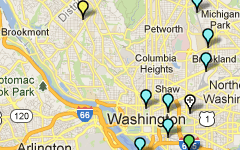Summary of Metro’s Recent Cost Efficiencies and Savings
Over the last five years, Metro has cut $200 million through efficiency-related reductions and achieved similar savings in costs avoided through management efficiency initiatives, restructurings, one-time savings and other actions, including:
MetroAccess: In FY11, by encouraging select paratransit riders to use fixed route transit, Metro saved more than $25 million in paratransit costs. Continuing to promote this travel training has lowered MetroAccess demand and has allowed Metro to avoid spending an additional $10 million in FY13 alone.
Energy Efficiencies: Metro’s bus fleet has improved its fuel economy by 27 percent over the last eight years, saving money on rising fuel costs. Meanwhile, Metro’s facilities are saving money as well – the new Shepherd Parkway facility is LEED-Silver certified – and the new escalators and elevators are realizing significant energy savings.
Parking Facilities: Metro saves $3.1 million each year as a result of automating its parking facilities.
Employee Health and Wellness: As a result of a health insurance benefits program audit, Metro has cut $3 million per year, and plans to continue on the wellness track by incentivizing healthy behavior and habits to help its employees, increase productivity and further reduce health insurance costs.
Overtime: An organization-wide review of overtime procedures and pay is paying dividends. Since the end of 2012, overtime is $3 million lower than the same period for each of the two preceding years.
Transaction Costs: Metro is encouraging more SmarTrip Card usage, and as a result has reduced the use of paper fare media from 20% of payments to 12%, saving $1 million per year. Metro has its eyes set on more savings by targeting a 5 percent paper fare card usage rate.
Identifying More Efficiencies: An independent efficiency analysis is underway to assist in identifying further opportunities to save money in administrative areas.
For more information:
Download both the full Momentum plan and the Executive Summary.
Regional support is important to making Momentum a reality! A number of regional stakeholders have already endorsed Momentum. Please sign on and add your name to endorse Momentum and send the message that public transit is vital to the National Capital Region.


Recent Comments